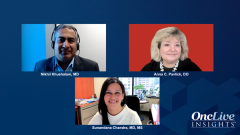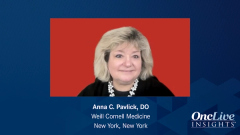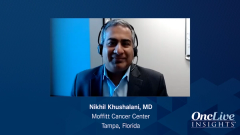
Multidisciplinary Management of CSCC
Nikhil Khushalani, MD, discusses the multidisciplinary team approach to treating patients with cutaneous squamous cell carcinoma.
Episodes in this series

Transcript:
Sunandana Chandra, MD, MS: Let’s focus next on cutaneous squamous cell carcinoma [CSCC]. Dr Khushalani, can you describe the multidisciplinary nature of management of cutaneous squamous cell carcinoma and how people can use the expertise of multiple colleagues at their institution or other institutions to provide the best recommendations for their patients?
Nikhil Khushalani, MD: That’s critically important for the optimal care of our patients, particularly with CSCC. If you look at what Dr [Anna] Pavlick said, the vast majority of our patients with CSCC are localized, so 95% to 97% of them can be addressed in the dermatology office. She made a very good point in terms of the epidemiology, that this is a disease of ultraviolet light exposure over time. The epidemiological insult has occurred over a span of decades. Therefore, these patients don’t necessarily present with 1 tumor. They often have multifocal disease or recurrent cutaneous squamous cells or keratinocytic carcinomas. Those 3% to 5% of patients, considered high risk based on the size of the tumor, location of the tumor, certain histological characteristics, such as poorly differentiated tumors or perineural invasion, have a higher risk for lymph node metastases as well as distant metastases.
In the course of today’s topic, we’ll discuss locally advanced tumors, which are the vast majority of CSCC that we see as medical oncologists—these tumors have already exhausted standard surgical or radiotherapy options—and a smaller minority of metastatic tumors, such as metastases to the lung, lymph nodes, bone, and other visceral organs. What becomes critically important is that traditionally surgery was the mainstay of treatment in this disease. But in high-risk cases, we have to consider involvement of the radiation oncologist because many of them are prone to local or locoregional recurrence, and radiation can potentially reduce that risk of recurrence.
We’re in an era where our systemic options, specifically with anti–PD-1 immunotherapy, have remarkably changed treatment paradigms for advanced disease. These regimens are being tested in the adjuvant setting for high-risk patients as well. More important, in patients who present with nodal disease or clearly locally advanced disease that’s borderline resectable, we’re considering immunotherapy up front.
It becomes important for good crosstalk between the surgeon, the dermatologist, the radiation oncologist, and the medical oncologist. Even within surgery, the vast majority of these [patients] are seen by head and neck surgeons, who traditionally will take care of mucosal tumors of the head and neck but will often address cutaneous tumors as well. So there needs to be that crosstalk.
Dr Pavlick also utilized the term disease of neglect, which is critically important. That’s where our social work team and nursing education become important, because some of our patients, unfortunately, have psychosocial issues that led them to the path of neglecting their tumor. So a multidisciplinary approach is critically important. Finally, in the 10% to 15% of patients who have high-risk disease because of their solid organ transplant or allogeneic transplant status, they’ll need cooperation with their transplant team as well.
Transcript edited for clarity.






































